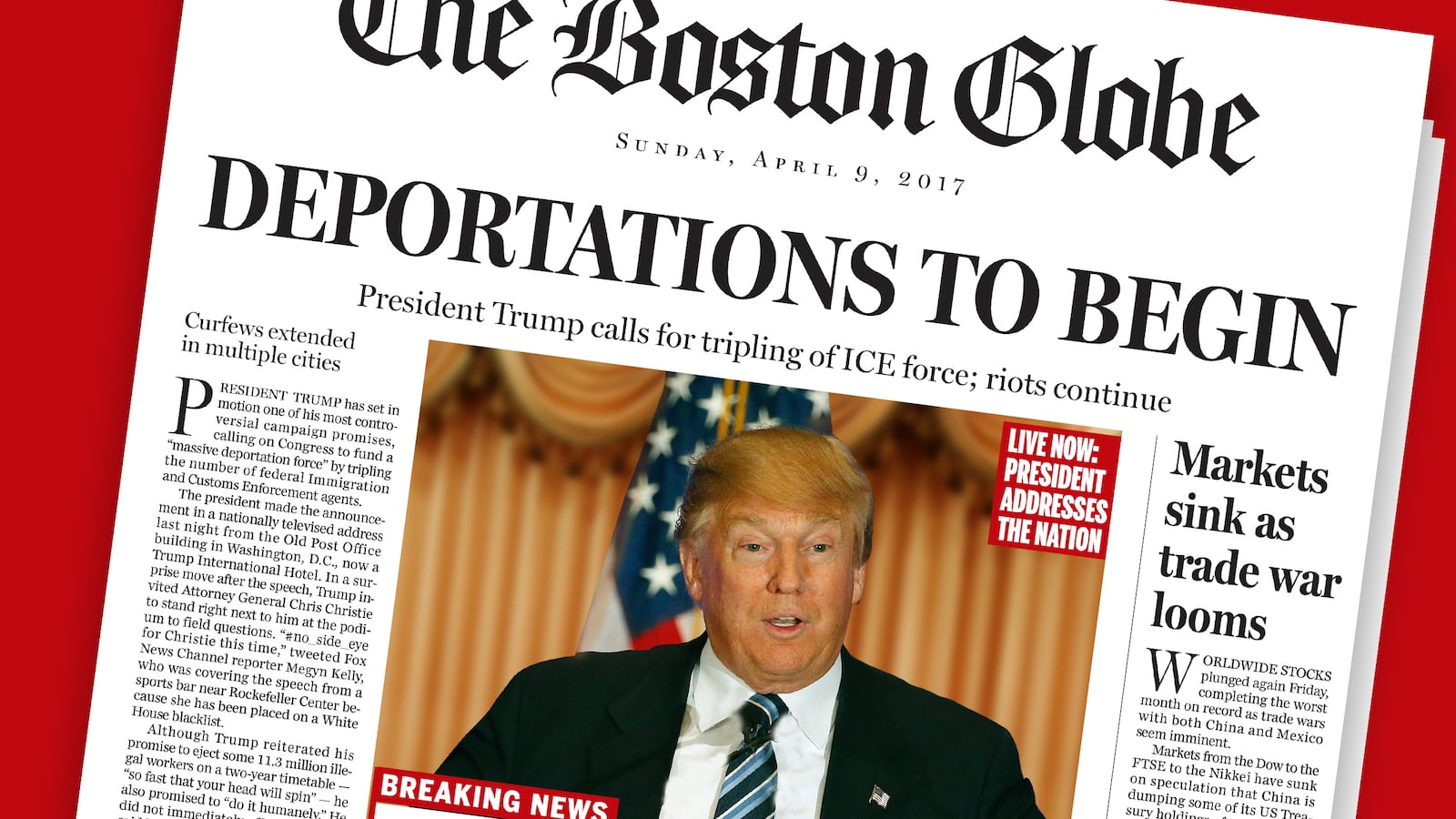On Sunday, as part of an editorial package in its Ideas/Opinion section, The Boston Globe took a glimpse into the future. On its mock front page, the Globe postulated what the paper might look like one year from now—in a world wherein Donald Trump had captured the presidency.
The results, you will be in no way surprised to hear, don’t look promising: mass deportations, trade wars, and worst of all, Kid Rock as Japanese ambassador. The effort, which they teased online over the weekend as “the front page we hope we never have to print,” was highly unconventional, particularly for a broadsheet not exactly renowned for its trolling bona fides (outside of the sports section anyway). It looked like the type of world-building set dressing you might see in the background of a dystopian science fiction film.
Naturally, the issue has garnered a lot more attention than the typical Sunday editorial from the paper. This is in part owed to the inescapable Trump boost baked into all media today, but the cover also picked up steam for its departure from traditional Serious Journalism Standards.
Indeed, more than a few have criticized the Globe (where I, full disclosure, have contributed many times over the years) for lowering themselves with such a stunt—more The Onion than journalism. But considering that a recent memo from editor Brian McGrory called for “a no-sacred-cows analysis” and “reinvention initiative” as the company, like much of the print media, faces “irreversible revenue declines,” perhaps this is a step in the right direction.
I spoke with editorial page editor Ellen Clegg about how the project came together and tried really, really hard to get her to detail who, specifically, if anyone objected the cover at the Globe, which she did not do.
The Daily Beast: Are you pleased with how it’s rolled out? It’s certainly gotten a lot of attention.
Ellen Clegg: Yes! Unconventional times call for unconventional takes on the usual editorial positions, on the usual presentation, that’s what we intended to do here and I feel we achieved our goal.
TDB: Was there a sales uptick? Did you hear any numbers yet
EC: Oh, no. That’s not my department.
TDB: When was the idea born?
EC: Something like this doesn’t happen over night. As an editorial board, we’ve been researching Trump’s positions, listening to his speeches, obviously digging into some of the issues he’s presented. And we wanted to push it out to its logical extreme. We take him as a man of his word and assume he will do at least some of the things he promises to do. It’s been in the works for a while.
TDB: What was the scope of the team?
EC: Our editorial board consists of all our editorial writers, our opinion columnists, our editors. And I report to John Henry, the publisher. Right now, we’re about 17 staffers.
TDB: I’m sure there was a lot of debate about doing this. What were some of the concerns that were brought up? Tell me about the back and forth.
EC: We wanted to get the tone right, and the facts right. We’ve been through a number of drafts and kicked ideas around. But each piece rests on a factual basis. At one point, I took the text and footnoted it for my own purposes to trace each position back to the facts of the real world.
TDB: So that’s something that was a concern? Making sure there was a factual basis for everything?
EC: Yes. We took his real positions on launching a deportation force, for example. He has said he wants to deport illegal immigrants—there are 12 million strong in this country—and to do it on a two-year time table. And we looked at the reporting other outlets were doing, including a recent column by Jeff Jacoby in our paper. Jeff’s on the board, he’s one of our columnists, and he scoped out the costs of some of these programs, and I think he estimated the deportation policy put forth by Trump would cost $400 billion.
TDB: I think what I’m getting at, in a larger sense, is that this is different and out of the ordinary, which is why people are interested in it in the first place. Was there anyone on the board who maybe had cold feet about it?
EC: Because our work is unsigned, we don’t talk about individual positions, but my role—and the board feels its role—is to debate issues, and come to a consensus on positions and issues. We do this every day with our editorials. Signed pieces are different. Something that represents the positions of the institution, we have a process—just like you think it would be—of discussion, debate, back-and-forth, until we come down in a position that the Globe can take.
TDB: What about higher-ups? Was there any concern. Did you hear from anyone upstairs that wanted to take any oversight?
EC: Well, John Henry, the publisher, is a part of the editorial board, so he’s a part of that process.
TDB: I guess any controversy and debate that I’m sort of looking for here isn’t something that you’re excited to shed any light on.
EC: It’s a debate over a long period of time. I will say that we wanted to… we did notice a darkening in tone over the last couple of months at some of Trump’s rallies—a toxic mix of violence and rhetoric—so we wanted to align our vision with that tone.
TDB: How many different premises and jokes did you come up with? There are jokes littered throughout. Did you come up with a huge list? Are there some that didn’t make the cut you liked personally?
EC: [Laughing] I’m not the person who should… You know we—let’s just say we worked on the text through a process of weeks. It’s not something we did overnight.
TDB: Trump responded to the cover. Would you consider that an effective outcome? Although, then again, getting him to respond to any slight isn’t hard.
EC: We didn’t know what to expect. During our endorsement process to endorse candidates in the New Hampshire primary, we put out an invitation to every single campaign to have the candidate come here to interview with the board. That’s our typical process. Some came; some did not. Trump did not come. I’m not surprised. I’ve seen him comment on other papers as worthless. Certainly he’s talked about The Washington Post, New York Times, and Fox News as worthy of contempt.
TDB: Were you trying to get this out before the Massachusetts primary?
EC: No. We wanted to get it out before the campaign got too far along. Before the convention certainly. But we didn’t have a self-imposed deadline.
TDB: There’s been a couple regular criticisms I’ve heard. One is that it wasn’t actually the front page—not that it was misleading per sé, but things seemed to indicate it was going to be the front page.
EC: I think people read the paper online differently, and so when they saw it, absent certain context, I suppose it could look like the front page. It says on page K1, which is the Ideas and Opinion section. The date is April 9, 2017. The headline says President Trump. The Editor’s Note on the cover has a red headline explaining what it is, and leads people to the more conventional editorial on the inside.
TDB: It’s not easy satirizing Trump, not just here, but just in general. There’s almost nothing that seems out of the realm of possibility.
EC: We worked with the facts on the ground, and his own positions, and pushed out from there.
TDB: Another criticism: deportations, the market crashing, civilians being killed. None of that is far-fetched. Some of it is going on today.
EC: Well, the Obama administration has been deporting people. And as we say in the piece on soldiers refusing orders, CIA chief General Michael Hayden has, in fact, said that American armed forces would refuse to act if Trump, as Commander-in-Chief, said to attack families.
TDB: Do you think Trump is going to be president or what?
EC: In Massachusetts, he’s received more than 300,000 votes. So I think anything is possible. It’s an unusual political season, I think anyone would concede that. I see, as of this morning, the AP tally in delegates—he has 743, Cruz 545, Kasich has 143. New York is coming up. It’s delegate rich, with 95 on the GOP side. From what it looks like now, no one will have enough delegates to put them over the top at the Republican convention. So I think, recognizing that, our editorial calls on the GOP to ask some tough questions, to do some hard thinking about Trump’s vision for the country and what that means and what kind of party they want to be, and perhaps turn to other leaders. Like, we mention Mitt Romney, we mention Paul Ryan, who might bear the standard more honorably.
TDB: Any plans to dip back into writing speculative science fiction again?
EC: [Laughing] Well, we’re going to continue to report rigorously on all candidates for the duration of the campaign, and continue to come to sharp opinions, both in editorials written by the board, and in our columns.
TDB: So no aliens are coming or anything like that?
EC: I don’t think so!






